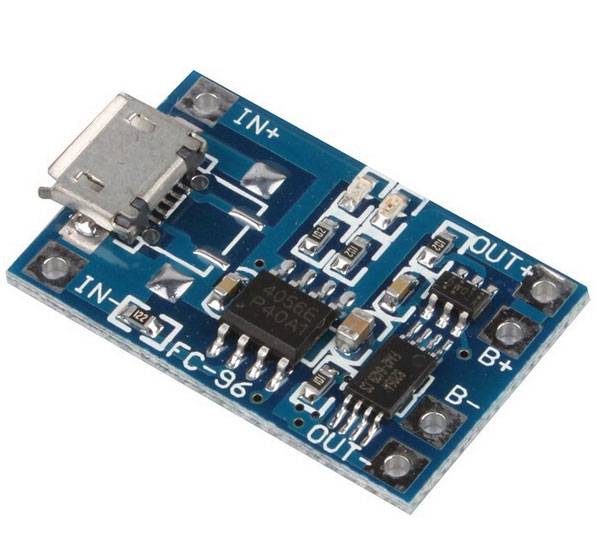I’m wanting to build a robot based on the Arduino platform. The plan is to just use 2 TT Motors with wheels and a few sensors and an Arduino Uno etc. nothing amazing.
But what I would like is to be able to keep the battery permanently connected to the robot and include the charging module on the robot too, so that I could hopefully just plug it into a USB cable for charging or in the future have it home to a charging station like a Roomba and have it connect to some contacts to charge. But that’s really a problem for another time.
I was looking at getting a couple of 3.7v 18650 batteries and using them in series in a cradle to get the voltage I want, and then using the charging module I already have to charge them. The charging module I have is pretty much this one… 1A, Micro-USB input etc. Can get them anywhere for a few dollars.
But from what I’ve read that won’t work because the voltage is too low and if I use two batteries then I have to use a balancing circuit.
The other charging module I could get it this:
https://www.dfrobot.com/product-1713.html
That seems to be for 7.4v LiPos which as I understand are made from two cells, but it doesn’t seem to have anywhere to plug in the JST plug for balancing which the 2 cell LiPos all seem to have. Would it still work? Would I just leave the JST connector unplugged?
This is the 7.4v LiPo which I had my eye on if I can’t get the 18650s to work out:
https://www.rclipo.co.za/lipo/2-cell/onbo-1600mah-2s-45c-lipo-detail
I have to order the batteries from in South Africa because there are laws about importing batteries and basically nowhere online will ship batteries here because you need a special license to do it. But if you have a suggestion for a battery from literally anywhere, please share! I’m sure I can find a supplier here!
I would like 7.4v and as many mAh as I can get. But right now I’m feeling totally overwhelmed by all the options for batteries, the S and C ratings (Both charging and discharging) etc. What I know for sure is that I want the batteries to be permanently attached to my robot and have the charging circuitry on the robot too. I don’t want to have to remove and charge the batteries in a separate charger.
Can I use the 7.4v charging module from DFRobot with two 18650 cells in series? Can I use the DFRobot module with the ONBO battery? Can I even get a charging module that that will charge a 2 cell LiPo via USB or barrel jack? Heck it doesn’t even need a USB or other jack, it just needs to fit on a small robot and have somewhere I can solder onto.
Totally overwhelmed by the options and stress headache right now. . I’m a programmer, not an electrical engineer. Just need some guidance.


